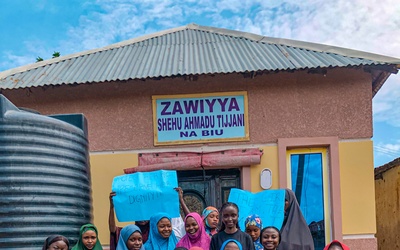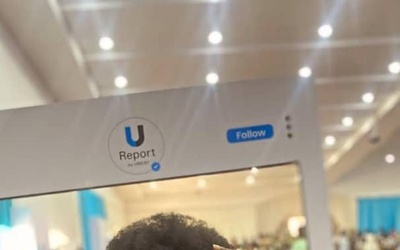In December 2018, the UNICEF Innovation Fund announced its largest investment round yet - thirteen new startup companies using frontier technology solutions to create fairer opportunities for children. Among these 13 is a female-founded start-up from Nigeria called Imisi 3D. According to the founder, Judith Okonkwo, Imisi 3D’s solution will provide quality education tools through Virtual Reality (VR), which aims to enrich learning experiences for children.
“Our approach is broad-based, because we are looking to both engage people widely and get them to understand that the technology exists and what’s possible, as well as the specific applications of these technologies - a major one for us is VR for education -- especially for children. We want them to be able to have more meaningful and experiential learning experiences.”
Judith Okonkwo, Imisi 3D

UNICEF Nigeria/2019/Achirga
At the Imisi 3D creation lab, Judith Okonkwo explains how she plans to bring virtual reality to classrooms in Nigeria.
With UNICEF’s support, Imisi 3D will explore how to best develop innovative educational content based on curriculum needs and connectivity constraints of schools in Nigeria.
In January, a team from the UNICEF Innovation Fund in New York arrived in Lagos to work with Imisi 3D on a work plan that will turn their proposal into a reality. The one-week mission included a visit to a local junior high school to speak with students and teachers to better understand their needs and challenges. It also included a VR meetup with young people at the NG Hub in Lagos, which included aa hands-on session exploring Web XR with cohort mentor Fabien Benetou, participants were able to create XR content using their laptops and students tried out VR by Imisi 3D; giving their thoughts and opinions on the experience. The participants were also able to experience virtual reality technology through games and educational content.

UNICEF Nigeria/2019/Achirga
The UNICEF Innovation team, UNICEF Nigeria Country Office and Imisi 3D in a working session to enrich learning experiences for children using virtual reality technology.
UNICEF’s Nigeria Country Office was instrumental in helping Imisi 3D and UNICEF’s Innovation Team develop a better understanding of the country context and education challenges in Nigeria, where more than 10.5 million children are out of school. Together, the teams explored the possibilities innovations like VR can bring to learning outcomes for children who can access it. Four key recommendations emerged from these discussions:
The Imisi 3D project will start off in a public high school classroom in Lagos.
Working with students and teachers, and guided by the national school curriculum, virtual reality content for subjects such as Maths and Basic Science will be introduced.
Learning outcomes will be measured, using tests within the modules and school examination results.
Teachers will help create locally-tailored content and will receive training on how to take a child through the modules.
Challenges were recognized – most schools in Nigeria have limited resources, erratic power supply and congested classrooms. However, with careful planning and improvisation, the hope is to put VR in the hands of school children across the state and country soon.

UNICEF Nigeria/2019/Achirga
Fabien Benetou, from the UNICEF Innovation team, facilitating a Web XR session with participants at a meetup in Lagos.
“Imisi means ‘inspiration’ in Yoruba - and that is what’s possible with these technologies, that you can inspire, that you can do it in multiple dimensions and all the possibilities that come with that,”
Judith Okonkwo, Imisi 3D
Children who tried out virtual reality technology during the visit are already excited about the prospects of using it in schools. It will be fascinating to see how Imisi 3D’s project takes off in the pilot school, and to see more schools adopt virtual reality in classrooms to enrich school children’s learning experiences.
UNICEF Nigeria/2019/Achirga
Judith Okonkwo, founder of Imisi 3D, working with a member of her team on a VR for education project.
As ten-year-old Imran “It’ll be so much easier to learn if we use VR technology in our classrooms! You can learn faster and better withit”









